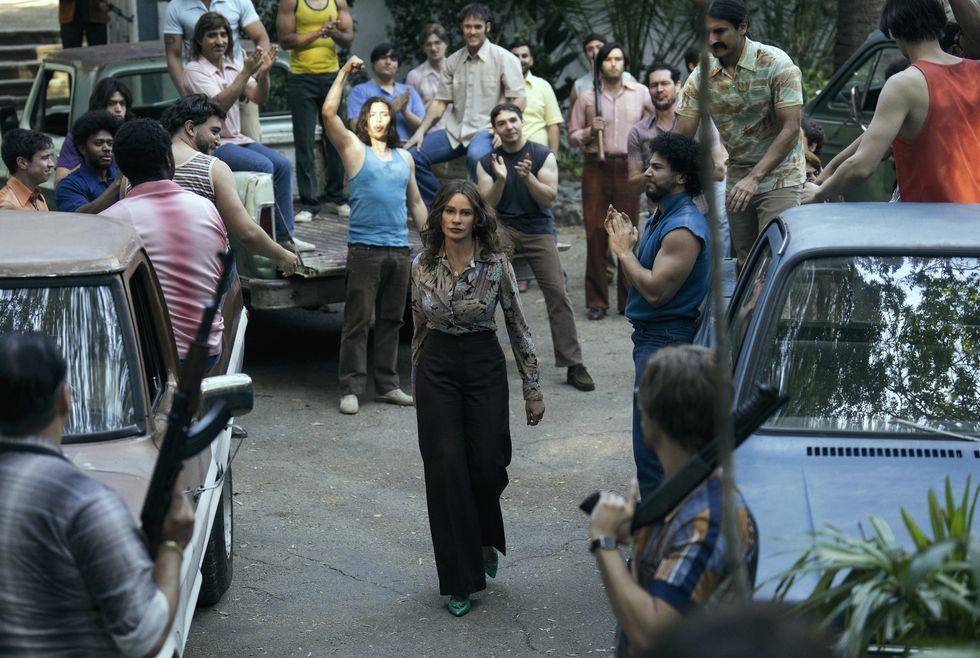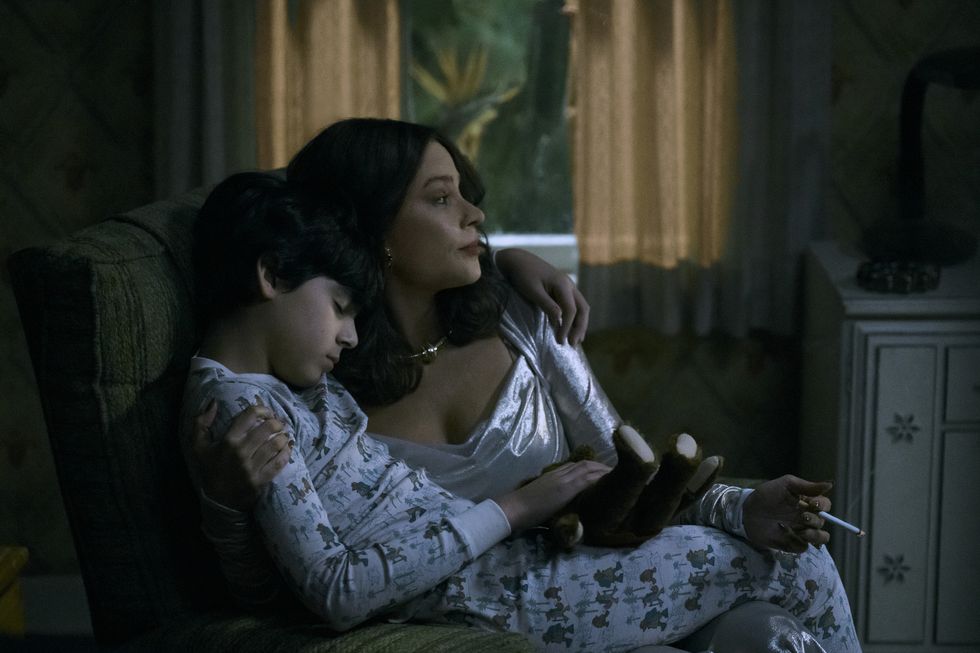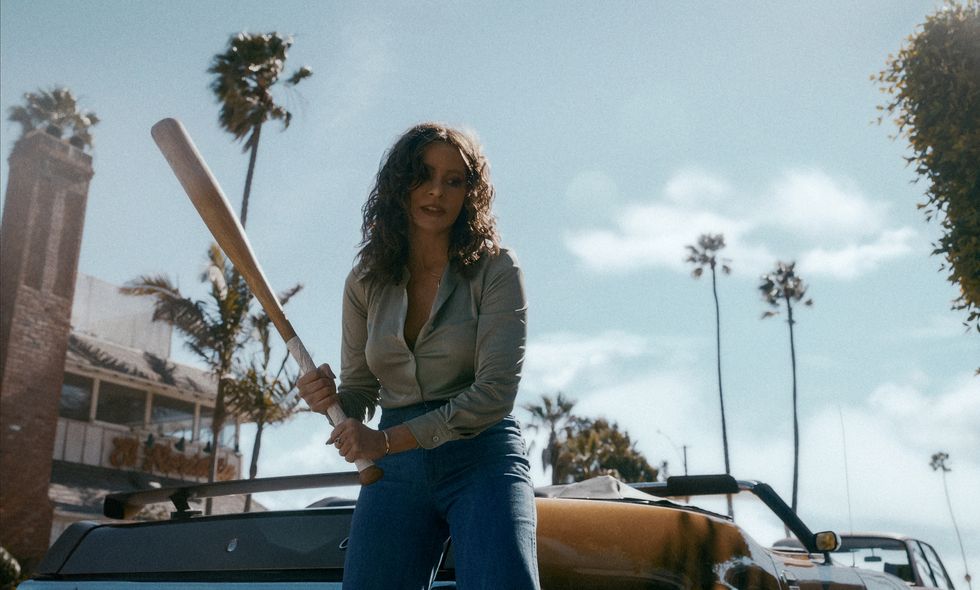Spoilers below for Griselda.
Griselda Blanco wasn’t that kind of godmother. There were no baptisms on her schedule, and no pumpkins transformed into horse-drawn carriages in her garage. Instead, imagine an IRL version of the Godfather—complete with a lengthy list of criminal activity and millions of dollars in her bank account.
With Netflix’s new limited series Griselda, viewers are introduced to a semi-fictionalized version of Blanco’s real life. Played by a prosthetic-donning Sofia Vergara, the six-episode mini series delves into the dark and murderous world of one of the most notorious (and successful) cocaine traffickers in the world.
When we first meet Blanco in Griselda, she’s taping a pad onto an oozing gash on the side of her abdomen. The scene is a stark contrast from the sparkling tiger-striped dress and thick gold collar around her neck. She’s frantically hunting for pain medicine, her hair disheveled, but when we finally see her face she’s in pain, but somehow remains calm and collected. If not a bit vacant. Unhinged. Determined.
Over the course of the next few episodes we’ll find all of these things to be true. Blanco is not one to be messed with and she won’t let anyone stand in her way. Motivated by money, a hunger for success, and her family, Blanco—better known as La Jefa (The Boss), was a savvy business woman and one of the most prominent drug lords the U.S. has ever seen. Her reputation was so renowned that even Pablo Escobar once said the only person he feared was Blanco herself.
“There has never been a woman who came close to achieving the power, wealth, and respect that Griselda did. And no trafficker, woman or man, ever elicited the same level of fear,” showrunner Eric Newman, the brains behind Narcos and Narcos: Mexico, previously told Tudum. “Griselda is a rise-and-fall story like none we have ever seen before. It’s thrilling, emotional, funny, scary, and tragic. Griselda is an antihero of the highest order and a series of contradictions at odds with herself.”
Set during the late 1970s and early ’80s, the series follows Blanco as she struggles as a single mother and attempts to start a new life in Miami after she and her three sons flee Colombia. But this isn’t nearly the hardest thing Blanco’s ever had to go through.
Born in 1943 in Cartagena, Colombia, Blanco was introduced to the criminal lifestyle at a young age. By the time she was 11 years old living in Medillín, she had kidnapped, ransomed, and killed a young boy from a wealthy family. She allegedly became a pickpocket and sex worker after running away from home.
After killing her first husband and helping the second build a drug empire in New York, Blanco fled back to Colombia in 1975 to escape conviction in Queens. There, she murdered her second husband and immigrated to Miami to build her solo empire.
“Most of the people know of Griselda as the ruthless, violent drug lord that she was,” Vergara said previously. “So we were very careful not to glorify her in the series. But we also wanted to take time to uncover the deeper story of Griselda, how beyond all odds, a poor, uneducated woman from Colombia managed to create a massive, multi-billion dollar empire in a male-dominated industry, in a country that was not her own, through tactics that she devised that were both ingenious and cruel.”
More of an origin story on the makings of a monster, Griselda investigates this era of Blanco’s life, not shying away from the nitty-gritty details. She’d go on to re-marry and have a fourth son, each milestone depicted in the show. The series also emphasizes Blanco’s drug use and hints towards her bisexual identity.
From her forcing people to have sex at gunpoint to creating the “Cocaine Cowboys,” the Netflix show is bloody and unflinching in the depiction of Blanco’s reign. And yet, it’s almost a tamer version of what was actually happening in Miami during this time. “She liked to be at war,” Blanco’s top hitman Jorge Ayala would later testify in court.
In one episode, Blanco orders the death of one of her henchmen, but the hit goes awry and ends up killing the man’s two-year-old son. This isn’t a dramatization for TV. Nor is the female Miami PD intelligence analyst June Hawkins, who helped secure the governmental aid that would lead to Blanco’s downfall, both of which were detailed in a 2017 podcast.
In 1985, Blanco would be caught and sentenced to 15 years in prison for conspiring to manufacture, import, and distribute cocaine. She’d also be charged with three counts of murder and receive 20 years for the offenses. She was eventually released and deported back to Colombia in 2004. Her three eldest sons were murdered and she was eventually killed in 2012 by a motorcycle assassin—ironically a murderous technique she’d made infamous during her heyday. At the peak of her career, her fortune was estimated to be a whopping $1.5 billion.
Marilyn La Jeunesse is a freelance journalist, audience development strategist, and author with words in Elle, Bustle, Teen Vogue, Allure, Glamour, People, InStyle, and more. A Mexican-American writer dedicated to uplifting Latinx voices, she has over 10 years of experience covering entertainment, beauty, fashion, wellness, and more.
"story" - Google News
January 26, 2024 at 12:49AM
https://ift.tt/nFJVPIs
The True Story Behind Netflix's Griselda - ELLE
"story" - Google News
https://ift.tt/dFo21Jn
https://ift.tt/kXDWL2K
Bagikan Berita Ini

















0 Response to "The True Story Behind Netflix's Griselda - ELLE"
Post a Comment